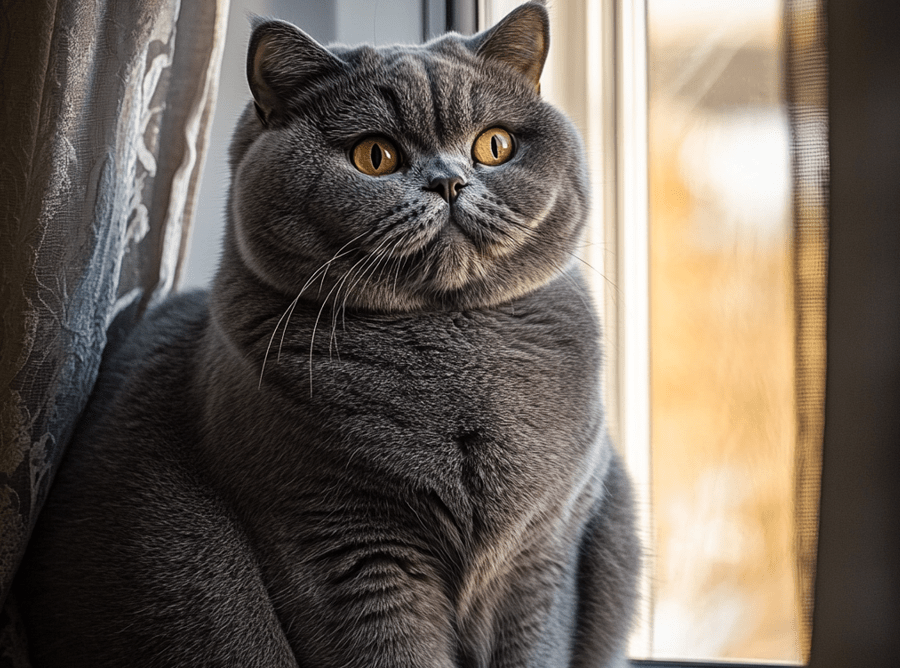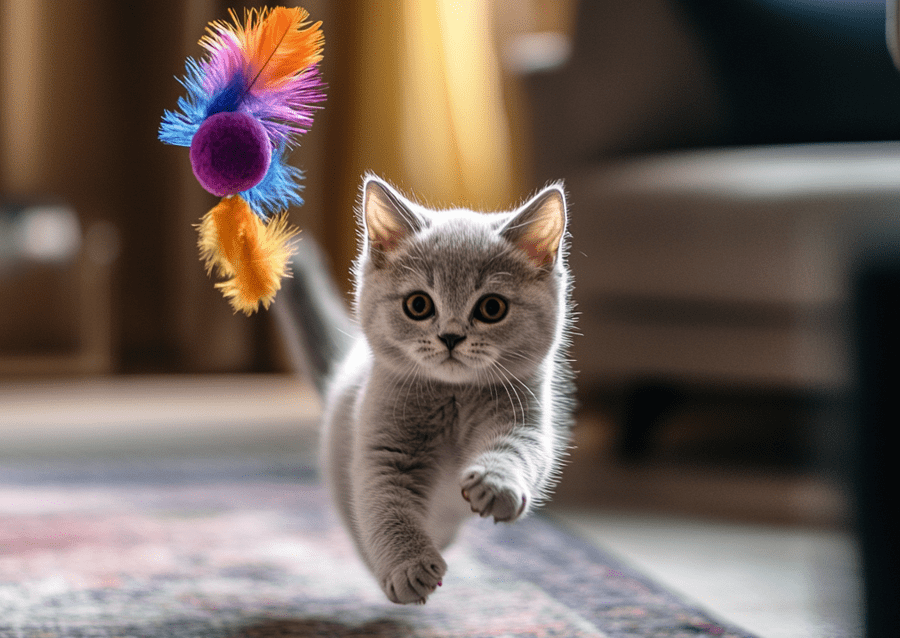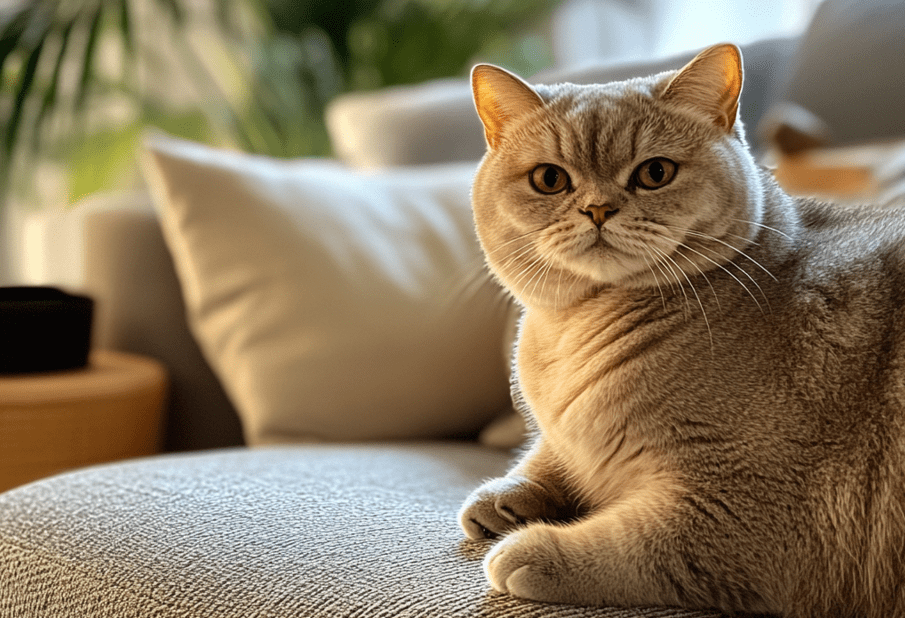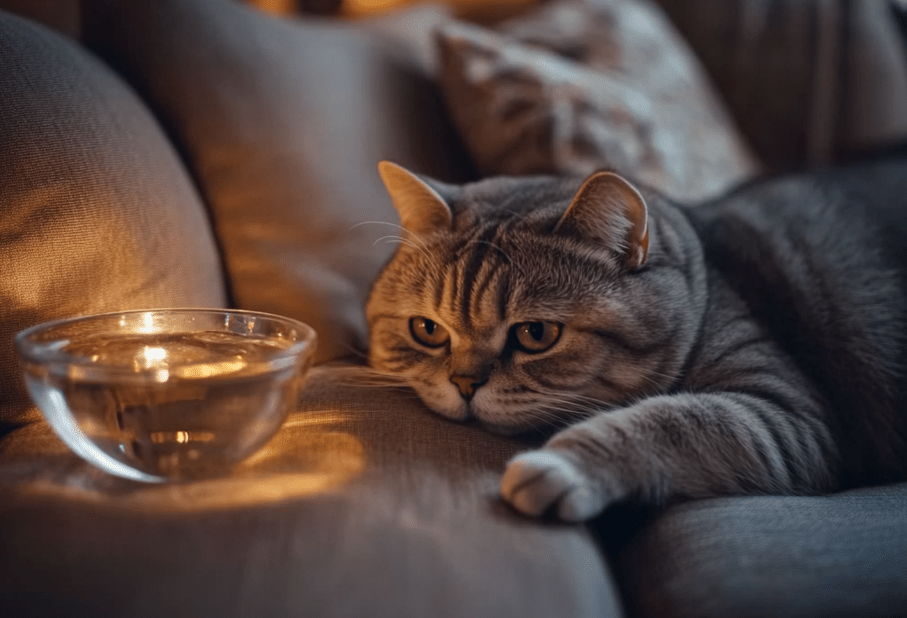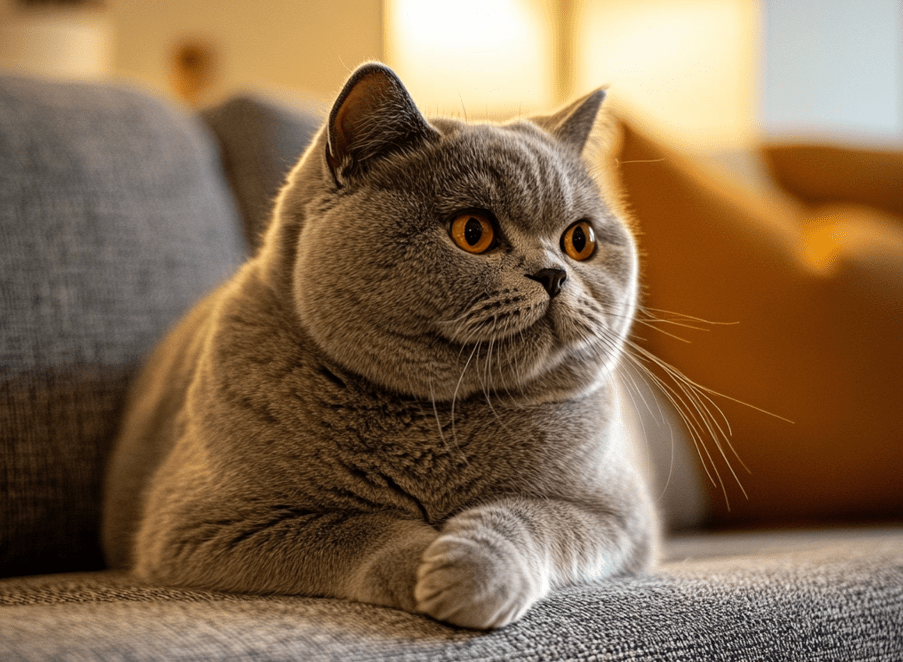
Being able to find a match between your personality and a cat breed can help you get the perfect fit for your needs. Just as you want a cat that complements your temperament, cats also expect certain behaviors and conduct from their humans, and the British Shorthair is no exception.
The British Shorthair cat personality is a delightful blend of dignity and affection. It is one of the most easy-going and calm cats breeds you’ll find. Although large and powerful, these cats prefer spending some quiet time sitting in cat trees rather than causing chaos.
These cats typically aren’t unruly, loud, or hyperactive. Instead of knocking glasses off your table, they prefer observing their family and surrounding environment.
If you’re looking for a cat that is quiet and comfortable, who likes to play but doesn’t prefer running around the house, then the British Shorthair is suitable for you.
The British Shorthair cat may not be open with you at your first meeting, but with patience and dedication, you’ll soon find your new furry best friend. In this article, we’ll explore many aspects of the British Shorthair cat’s personality that makes this breed so exceptional.
Overview of British Shorthair Cats

The origin of the British Shorthair breed is associated with Great Britain, though its origins aren’t very well-known.
The British Shorthair breed’s roots trace back to ancient Rome. When the Romans came to Britain, they brought domestic street cats with them, not knowing that very soon a new type of beautiful cat was about to begin. These cats helped the Romans control pest populations on their ships. After arriving in Great Britain, they began mating with European wild cats.
The Roman cats (likely imported from Egypt) were long, lean, and refined, while the European wild cats were large and more disobedient, highly aggressive, and had thick coats.
As a result of this mixing and years of selective breeding, the British Shorthair cat was born! This cat was a sturdy, short-haired excellent hunter that helped them adapt to their various environments, while being sociable and friendly.
British Blue Cats Personality: Calm Yet Affectionate
The British Blue cat personality is often synonymous with that of the British Shorthair. Known for their calm and affectionate nature, British Blue cats share many characteristics with their Shorthair cousins. These cats are loyal, loving, and independent, but they tend to form strong bonds with their humans once trust is established. With their serene demeanor, they enjoy spending time quietly by your side, often observing the household activities from a distance. The British Blue’s intelligence and adaptability make them great companions for various households. Keywords such as “British Blue cats,” “British Blue cat temperament,” and “British Blue personality” are crucial when understanding their unique qualities.
General Temperament
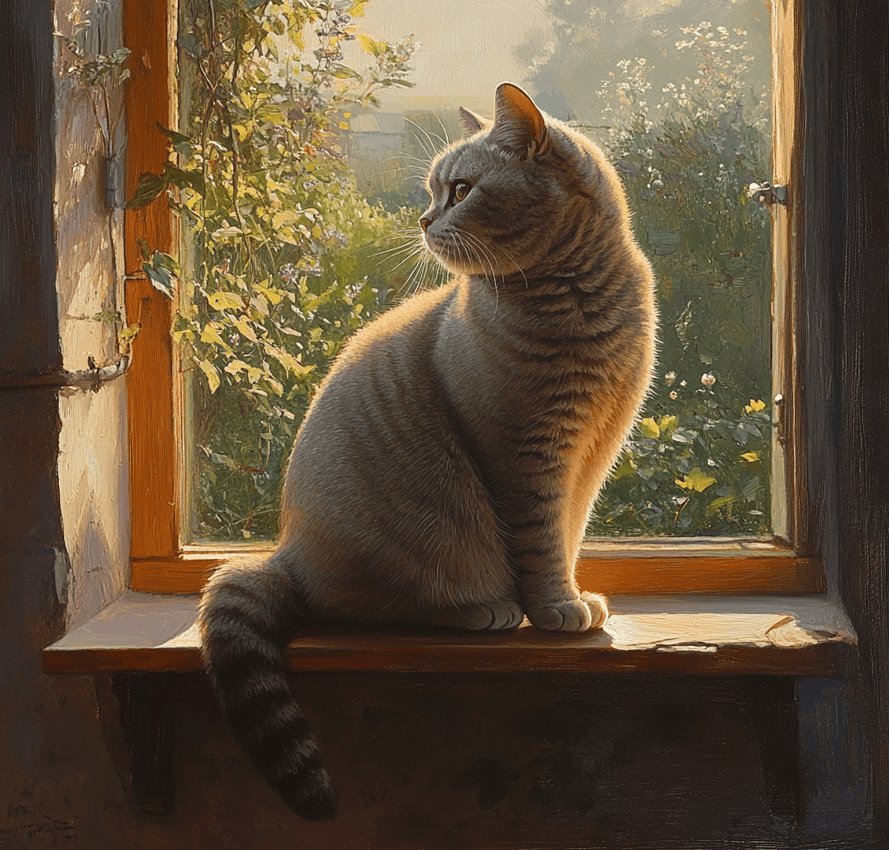
British Shorthairs are recognized for their calm and easygoing demeanor. Although friendly and kind, British Shorthair cats need some time to feel comfortable with their humans. Above all, all cats have their own boundaries which you must respect.
British Shorthairs are not the type to immediately communicate openly and bond with just anyone – but once they get used to you, you’ll see their full personality develop.
Generally, British Shorthair cats are very friendly towards other pets and children. They take some time to warm up to their humans, but they are not aggressive. They mainly need some time to develop a better understanding of their freedom in your space.
Once they determine and accept who their human parents are, they will show you plenty of love and affection. They are highly adaptable, very curious, and intelligent.
This cat has a very adaptable nature. They are active and affectionate, but not destructive or arrogant. They are completely independent when they want to be, but they will follow you around and keep track of you throughout the day.
They are very easy-going and treat people around them like family. After growing up from kittens, they can easily socialize and adapt. They make excellent first-time cat parents because they require very little maintenance. Everyone in your family will love them!
British Shorthair Behavior: A Delightful Blend of Independence and Affection
The British Shorthair cat’s behavior is an ideal balance between being independent and affectionate. These cats are not overly clingy but will seek companionship from their humans in their own time. They are observant and enjoy being around their family members without the need for constant interaction. British Shorthairs enjoy routine and predictability, making them a great fit for people who lead structured lives. They are patient and tolerant, often calmly enduring being around young children, provided that their space is respected. The “British Shorthair behavior” focuses on their calm and dignified demeanor, making them an excellent choice for families and first-time cat owners alike.
Social Behavior

British Shorthairs are good pets and loyal companions. They enjoy being near humans, although they may not want to be held or hugged. You might find that your cat is happiest sitting next to you on the sofa or staying in the same room with you.
They are typically peaceful cats. People have successfully raised them at home with other animals including dogs. If you already have pets, talk to your veterinarian or animal trainer about how to safely introduce a new pet to the family.
British Shorthairs like people, including children. However, like many cats, they don’t enjoy being handled roughly. Children should treat cats gently and respect their boundaries.
Their thick coat means they can shed quite a bit, but regular brushing can help control some shedding. Anyone bringing a British Shorthair home should be prepared to find cat hair throughout the house.
Also, they mature slowly. Most cats of this breed don’t fully grow until they’re almost five years old.
These cats are dignified, intelligent, and affectionate companions. They’re typically not lap cats, but they’ll want to sit beside you on the sofa or at least stay nearby. Females typically maintain a serious demeanor, while males tend to be more cheerful. These calm cats can mix well with dogs and stay peaceful with children, but they don’t enjoy being dragged around. It’s important to teach children to treat them with respect.
British Short Hair Cat Temperament: What to Expect
When it comes to British Short Hair cat temperament, these cats are known for their laid-back yet affectionate nature. They may take some time to bond with their owners but are worth the wait. Once they trust their humans, they are loving and loyal companions. British Short Hair cats do not thrive on constant attention but are quite content to sit beside you or observe your activities from afar. Their calm demeanor makes them a great choice for households with other pets or children. They do not easily get overwhelmed or stressed, allowing them to adapt to different environments smoothly. Keywords like “British Short Hair temperament,” “British Shorthair temperament,” and “British Shorthair cat behavior” highlight their relaxed and easy-going personality.
Affection and Independence

Some cats are extremely clingy and affectionate, while others prefer very little contact with their owners. British Shorthairs typically fall in the middle – they’re unlikely to sit and cuddle with you, but they show loyalty and affection in more subtle ways.
Personally, some British Shorthairs adapt well to light cuddling or petting, but they don’t want to lie in your lap or be picked up and held. Their way of showing affection is to curl up next to you on the sofa or follow you around the house.
The key with these cats is avoiding restraint, which makes them uncomfortable with lots of hugging or holding. When your cat is free to move away from you, it will be more comfortable receiving tactile love.
The good news is that British Shorthairs are generally forgiving if you push their boundaries too far. However, if the behavior continues, your cat may no longer feel comfortable coming to you or curling up beside you to sleep.
British Shorthairs are known for their calm and friendly temperament, and they are very easy-going cats.
British Shorthair Cat Personality: Gentle, Yet Playful
The British Shorthair cat personality is one of the most balanced among all cat breeds. These cats are affectionate, but not overly demanding, preferring to show their love through gentle gestures. While they may not be lap cats, they are extremely loyal and enjoy spending time with their owners. British Shorthairs love their playtime, but they do not have the high-energy tendencies of some other breeds. Their playful behavior is controlled and refined, making them ideal pets for those who prefer a calm yet entertaining companion. Keywords like “British Shorthair cat personality,” “British Shorthair traits,” and “British Shorthair cat temperament” accurately describe their nature.
Intelligence and Playfulness
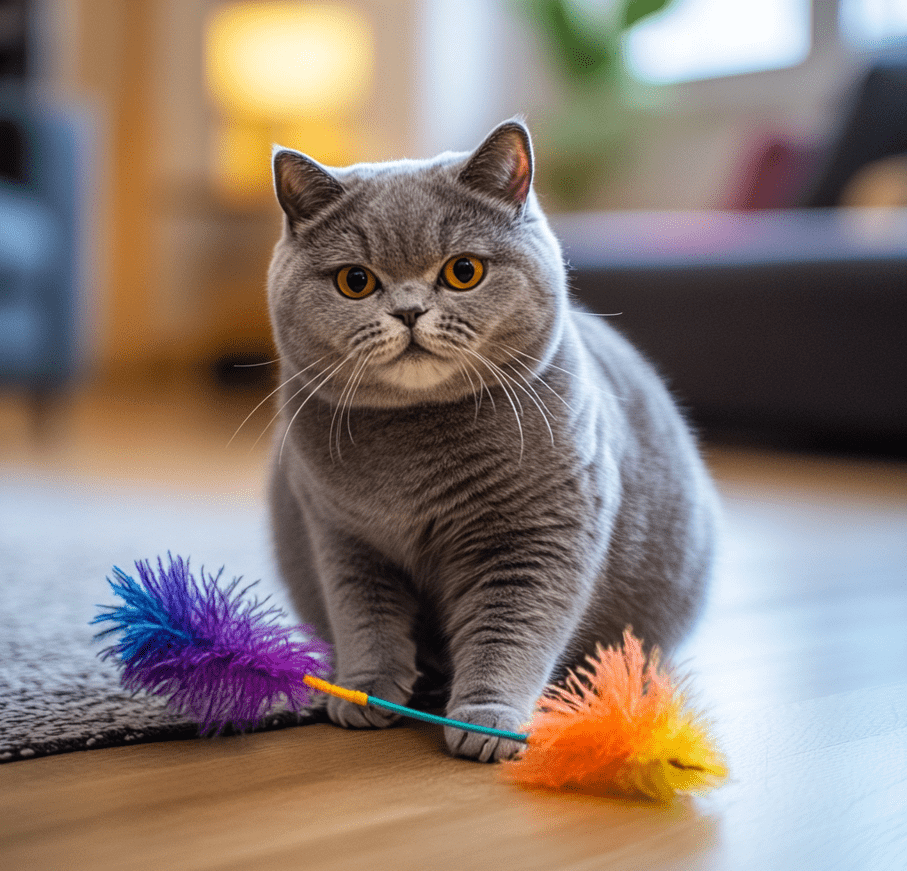
British Shorthair cats are moderately playful. Although they enjoy cat toys and climbing trees, they don’t need to be active all the time. They are a very calm-natured breed; rather than chasing laser pointers for hours, they prefer sitting and observing their surroundings.
When they do play, they aren’t loud or destructive, making them excellent pets for apartment dwellers or families with small children. Although they are among the larger cat breeds, they are very agile and refined.
Adaptability
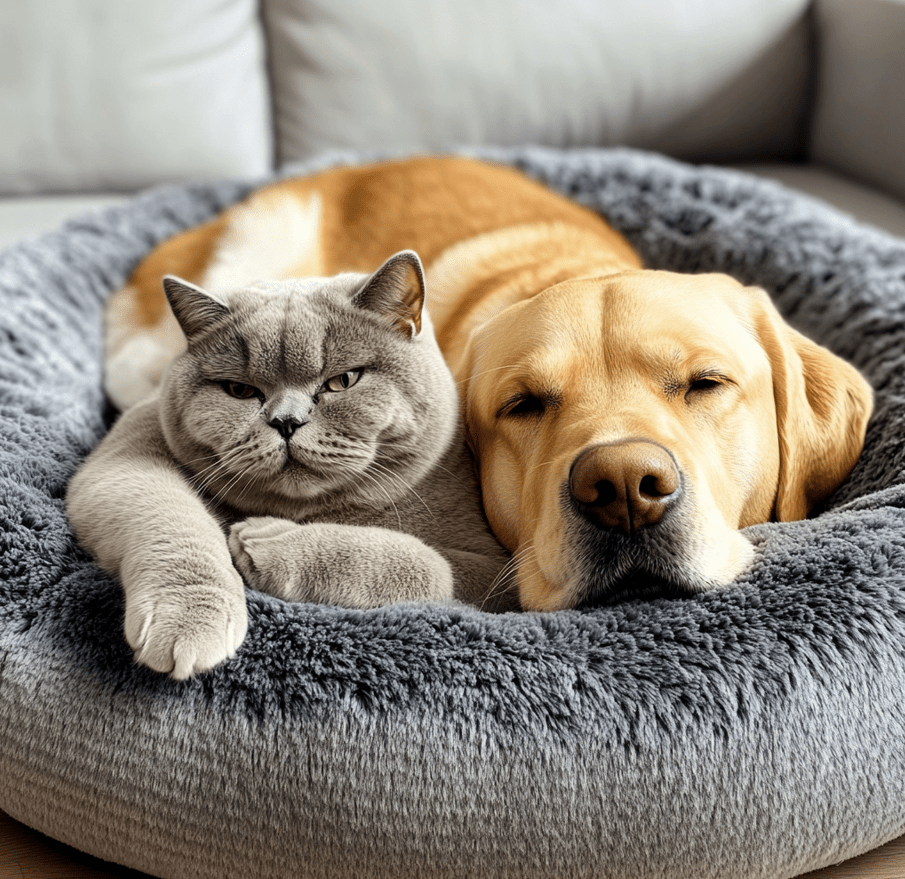
A common reason for pets to be returned home is conflict between pets. The family dog doesn’t like the newly adopted kitten. Or, the old hungry cat tries to attack the new cockatoo. To completely avoid these incidents, knowing a cat’s adaptability is essential.
British Shorthairs can mix very well with other pets, especially when they grow up together. Your cat will enjoy cuddling with other cat friends or running around with the family dog. In fact, they prefer having furry friends around, even though they love their humans very much!
However, since cats are highly predatory, they should never be left alone with small caged animals like mice, reptiles, or birds. Even the gentlest cat can harm these small pets during play. Always supervise any close encounters and try to keep them separate at all times to ensure safety.
Family Integration
Compatibility is a huge issue when keeping pets. Having a pet that fits your lifestyle is crucial for both your happiness and longevity. While personalities will vary, these cats work well in both multi-cat homes or single-cat homes.
British Shorthair cats are excellent additions to any cat-loving family. These cats are friendly and blend in with every family member. They’re social, even typically with strangers. If you want a cat that will do well with both newborns and adults, this is a great breed to consider.
Since these cats have moderate activity levels, they work well in most home sizes. You can keep them in a studio apartment or a 5,000-square-foot, three-story house – they’ll adapt to both situations.
British Shorthair is a thick, muscular cat so its nutrition should be carefully controlled. Despite its heavy bones and muscles, you need to ensure it maintains proper weight and doesn’t get out of shape. It needs adequate exercise. Interactive play may be necessary to keep the breed in good condition.
British cats will play when they want to and will find toys or make a toy out of whatever they can find if cat toys aren’t available.
Daily brushing is important, especially during seasonal changes when the coat becomes thicker or thinner. Even this short-haired cat can develop knots in its coat if not regularly brushed.
British cats tolerate being alone. They’re affectionate but spend time sleeping in the sun. British cats are easy to care for and can make wonderful, calm companions.
Characteristics of British Shorthair Cats: A Perfect Fit for Any Family
The characteristics of British Shorthair cats make them a perfect fit for a variety of homes, from single-person apartments to bustling family environments. These cats are friendly, calm, and independent, but they also show affection in subtle ways. British Shorthairs have a strong sense of loyalty and tend to form close bonds with their human families. They are highly adaptable, making them suitable for both first-time cat owners and those with more experience. Their dignified nature and moderate playfulness mean they are easy to live with and enjoy a harmonious existence in any setting. Keywords like “British Shorthair characteristics,” “British Shorthair traits,” and “British Shorthair cat personality” encapsulate the essence of this breed.
Social Needs and Attention Requirements
Once your British Shorthair accepts you, you’ll find that they want more attention from you. They love being petted and will let you know with deep purrs. They don’t like being picked up or held in laps.
If you’re drawn to their affection, welcome them with open arms. They like following you and seeing you as a complete entity around the house – but they don’t necessarily need your full attention.
These cats truly enjoy watching from a distance and receiving attention when they want it. If you try to win over your British Shorthair, play calmly. These cats don’t like being smothered, and those who accept their cool demeanor earn their respect.

